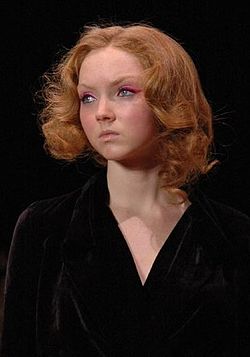Production
Writing and casting
In January 2011, it was announced that Downton Abbey actor Hugh Bonneville would make a guest appearance as a "pirate captain" in an episode of the sixth series of Doctor Who. [10] Lead actors Matt Smith and Karen Gillan felt that working with Bonneville was "great fun." [4] Bonneville previously played Sir Sidney Herbert and Tzar Nicholas I of Russia in the Seventh Doctor audio drama The Angel of Scutari . [11] Later in February 2011, it was announced actress and model Lily Cole was cast as a sea creature. [12] The producers were looking for an actress who is "beautiful," "striking," and yet somewhat "spooky." [4] Cole came early into the casting suggestions, and accepted the role when she was approached. [4]
The episode was written by Stephen Thompson. The producers wished to develop a Doctor Who episode set on "the high seas." [4] The episode was also made to allow the Doctor and his companions to "kick back and have some fun." [4] As the episode was pirate-themed, the producers wanted to fit in as many elements as possible from pirate fiction, including treasure, mutinies, a stowaway boy, walking the plank, storms, swords, and a pirate with a "good heart" who "isn't really evil." [4] "The Curse of the Black Spot" was originally planned to be ninth in the series, but was moved forward prior to filming as executive producer Steven Moffat felt the first half of the series was too dark. [13]
Filming and effects
Filming took place primarily in Cornwall and the Upper Boat Studios in Wales. The exterior of the pirate ship was filmed at a dock in Cornwall, while the lower decks were built from a set at the studio. The principal challenge to film at the dock was to ensure the audience would not see it. The crew set up smoke machines to simulate fog. To create the storm the crew used wind and rain machines, the latter of which went through 15,000 litres of water. The loud noise from the wind machines caused communication difficulties during takes. Anticipating they would get soaked, the cast present on the deck wore dry suits underneath their clothes. Before filming began on the storm sequences, actor Arthur Darvill heard that he would perform the stunt where he is thrown into the sea, and was willing to perform it. The stunt would later be performed by a double. [4]
The scenes in which Cole appeared on the ship were done by using a harness as if she was flying. Because the actress wore a green dress and makeup, the normal greenscreen was replaced by bluescreens in the studio. Cole felt it was fun to fly on the harness, but found it painful after a few hours. Gillan was allowed to perform several of her own stunts in the episode. She was excited to learn that her character would fight pirates with swords, and was taught how to handle one with basic moves. [4] [14] Gillan was also allowed to swing across the ship. However, a stunt double was required to film the sequence where Amy is thrown across the deck by the Siren. The sickbay set was also built in a studio. Because the beds were attached to strings, they were prone to swaying. The cast members who were asked to lie on the beds were instructed to stay still and not breathe heavily to limit movement. [4]

